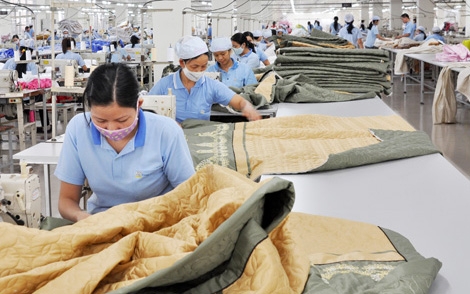Exports to the EU get a much needed shot in the arm

illustration photo
The preferences are applied to Vietnam and other developing countries during 2014-2016 under the generalised system of preferences (GSP).
“That’s very good news amid Vietnam’s economic and consumption market difficulties,” said former Deputy Prime Minister Vu Khoan.
“This will help Vietnam create more employment and further ensure social security,” he said.
Hanoi-based Garment Company X26 director Nguyen Viet Thang said the news would help this company earn nearly $1 million per year.
Quach Thi Nhung from South Korean-backed garment maker KJ Vina in Binh Duong province said there needed be more accurate calculations of how much her company would benefit from the new move, “but our export turnover from the EU will increase”.
Last year, the EU was Vietnam’s largest importer with $20.3 billion in revenue. Vietnam’s major exports to the EU market included mobile phones, which accounted for 43 per cent of Vietnam’s total mobile phone export turnover, footwear (36 per cent), computer (19 per cent) and garment and textile (16 per cent).
During 2009-2013, all footwear products from Vietnam were removed from the GSP, posing a great pressure on domestic producers and exporters. The move has increased import duties in the EU market by 3.5-5.5 per cent, while duties on leather and canvas footwear surged to 8 and 17 per cent, respectively.
The delegation of the EU to Vietnam and the Ministry of Foreign Affairs last week also announced a three-year, 2.9 million euros ($3.77 million) programme aimed to support Vietnam’s development by undertaking activities covered by the Partnership and Cooperation Agreement (PCA) clinched in June 2012. The PCA must be ratified by Vietnam and all EU members and the EU Parliament.
Under the PCA, the EU is committed to enhancing the benefit that GSP could bring to Vietnam.
“Notably, the PCA also facilitates enterprises from Vietnam to organise dialogues with governments of EU member states about investment and trade policies. EU enterprises can also do the same with Vietnam’s government. This mandatory mechanism will therefore help improve investment and trade between Vietnam and EU,” said Tran Ngoc Quan, deputy head of the Ministry of Industry and Trade’s European Market Department.
European delegation to Vietnam head Franz Jessen said the PCA boasted a mechanism where Vietnam-based enterprises would be provided updated policies about EU trade, including barriers which were often proved to be banana skins for Vietnamese firms.
What the stars mean:
★ Poor ★ ★ Promising ★★★ Good ★★★★ Very good ★★★★★ Exceptional
Latest News
More News
- Foreign fruits flood Vietnamese market (December 09, 2025 | 13:22)
- Vietnam’s fruit and vegetable exports reach $7.8 billion in first 11 months (December 05, 2025 | 13:50)
- Vietnam shapes next-generation carbon market (November 26, 2025 | 15:33)
- PM urges Ho Chi Minh City to innovate and remain Vietnam’s economic locomotive (November 26, 2025 | 15:29)
- Experts chart Vietnam's digital finance path: high hopes, high stakes (November 14, 2025 | 10:56)
- Vietnam’s seafood imports surge 30 per cent in first 10 months (November 10, 2025 | 19:35)
- Vietnam’s durian exports hit $1 billion milestone (October 30, 2025 | 17:41)
- Beyond borders: Sunhouse and new era of Vietnamese brands on Amazon (October 28, 2025 | 10:46)
- Record-breaking trade fair set to open in Hanoi (October 15, 2025 | 15:59)
- Timber sector seeks solutions to VAT refunds (October 14, 2025 | 18:58)
















 Mobile Version
Mobile Version